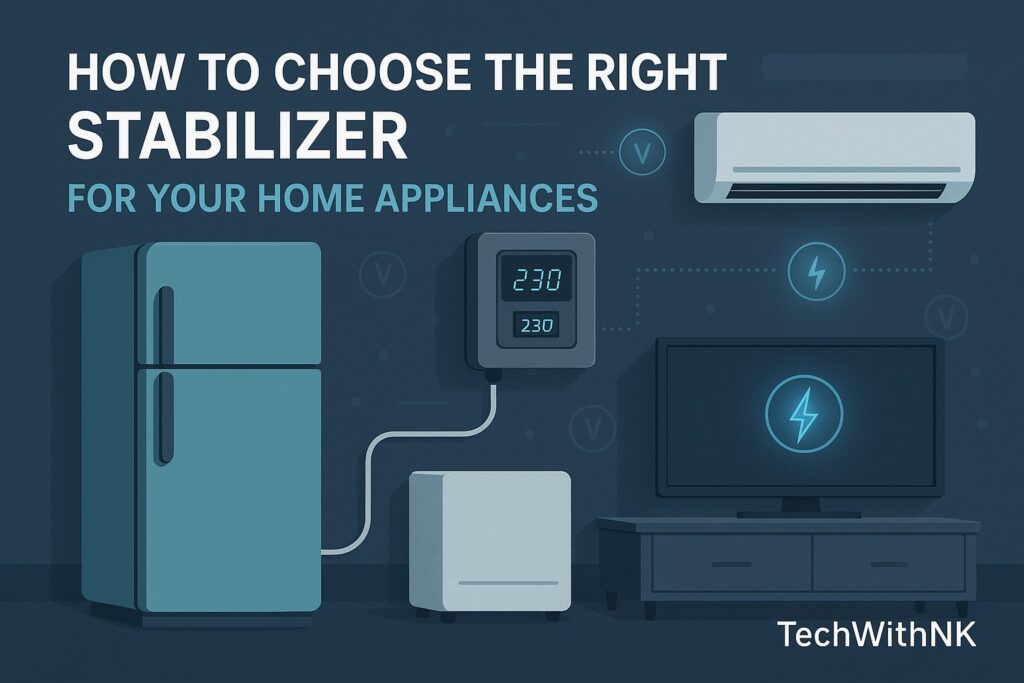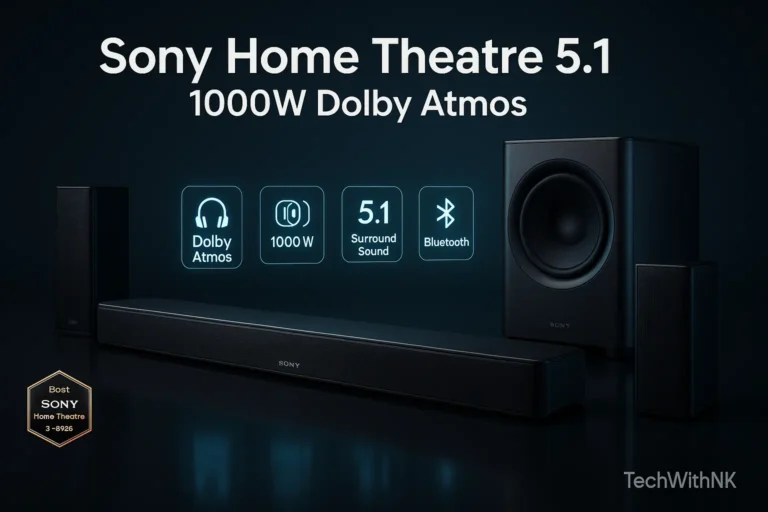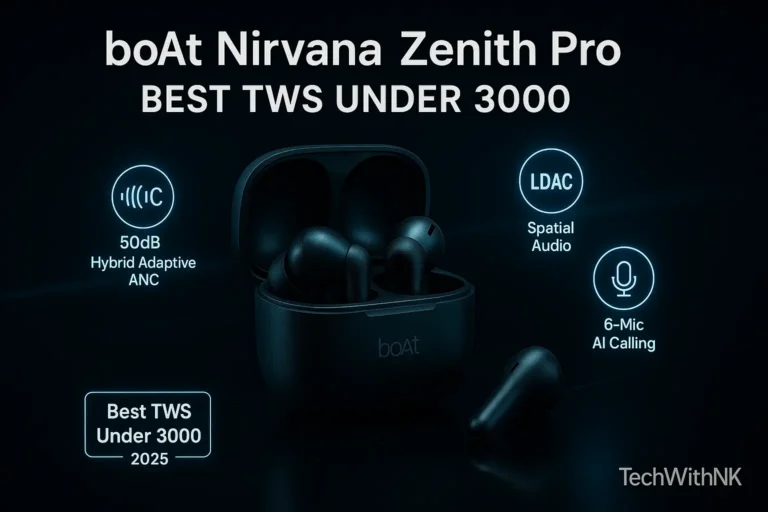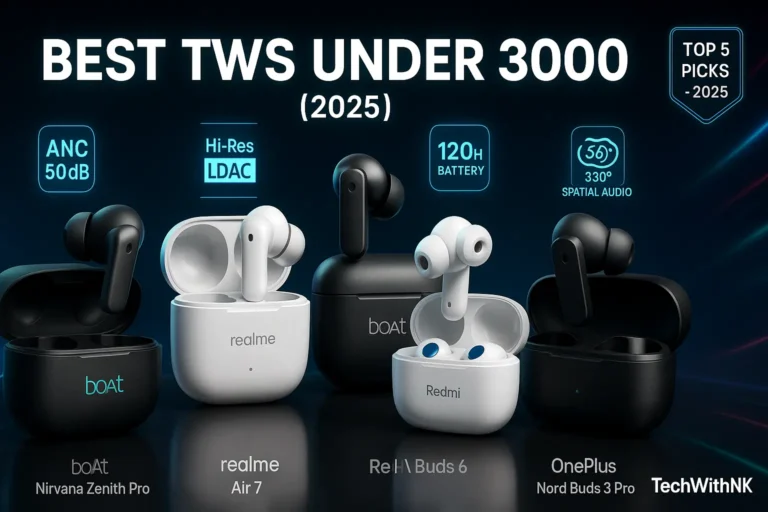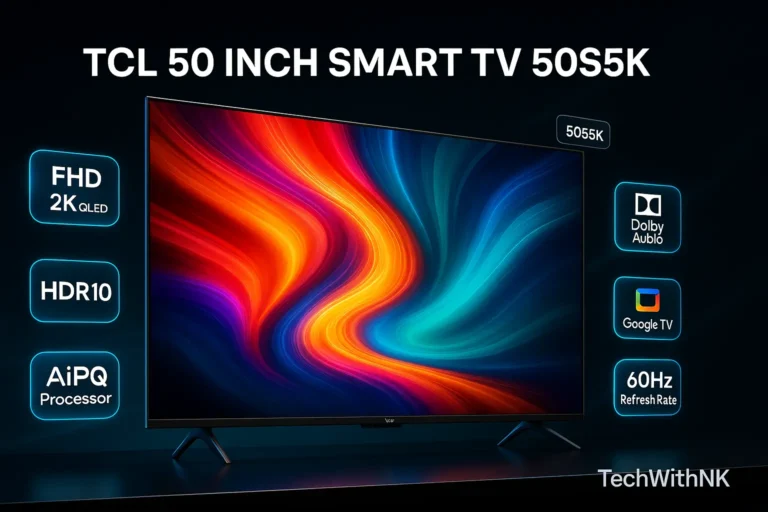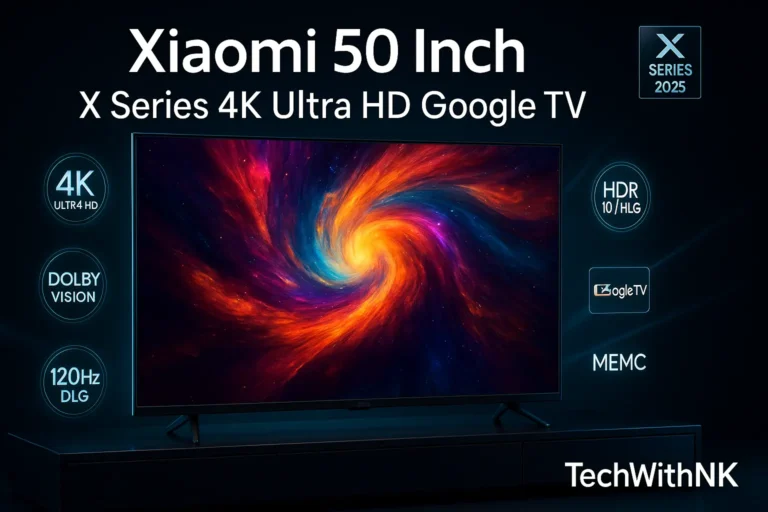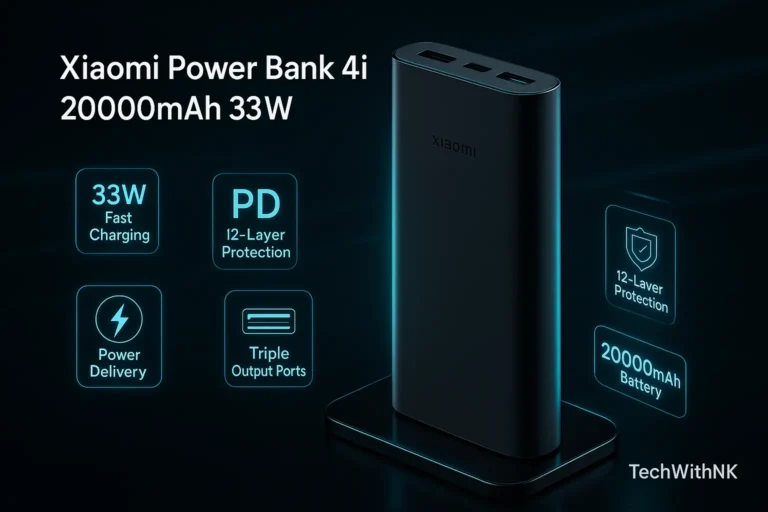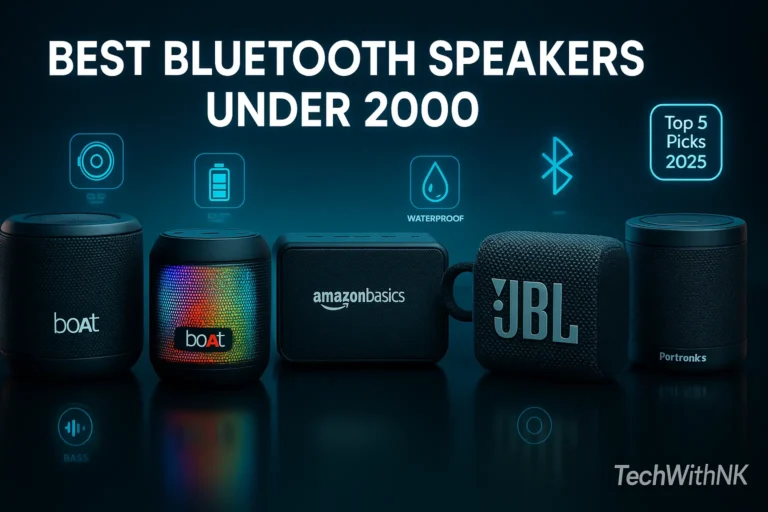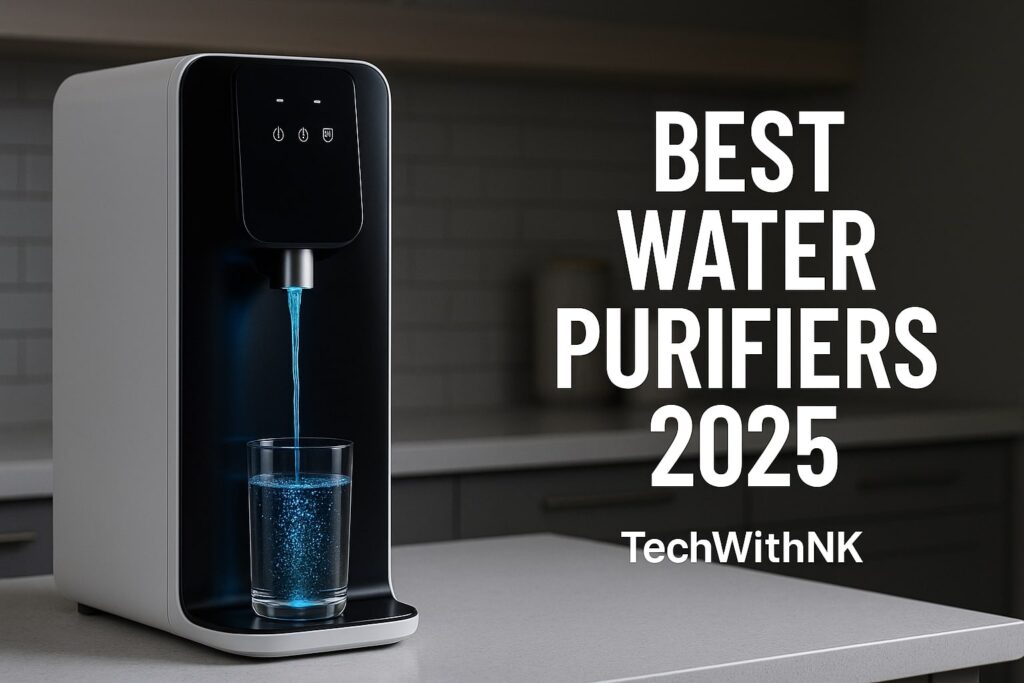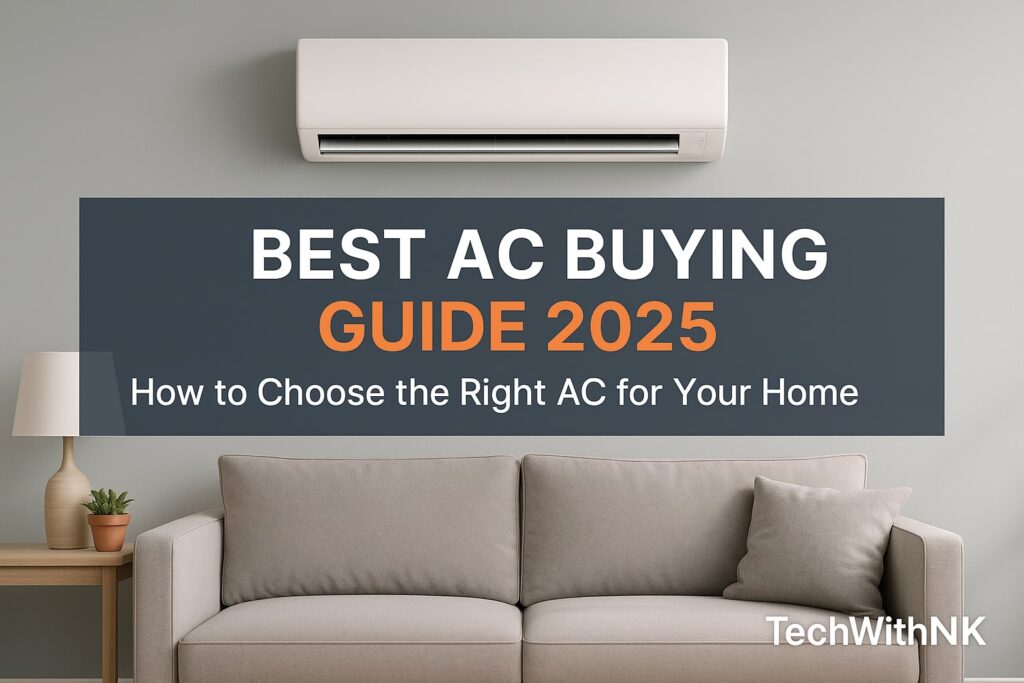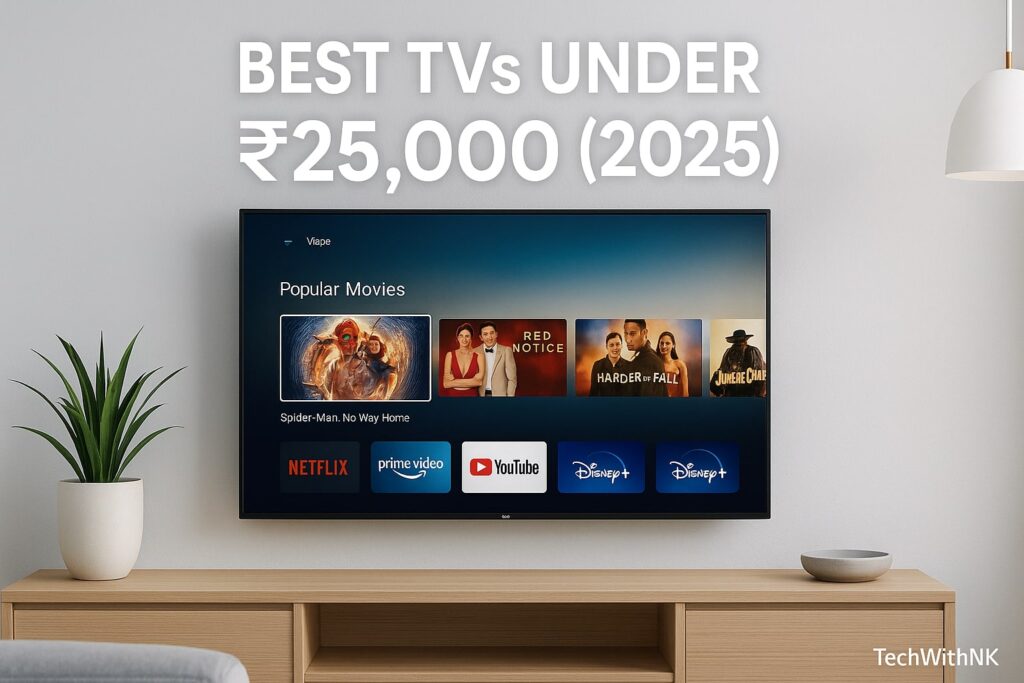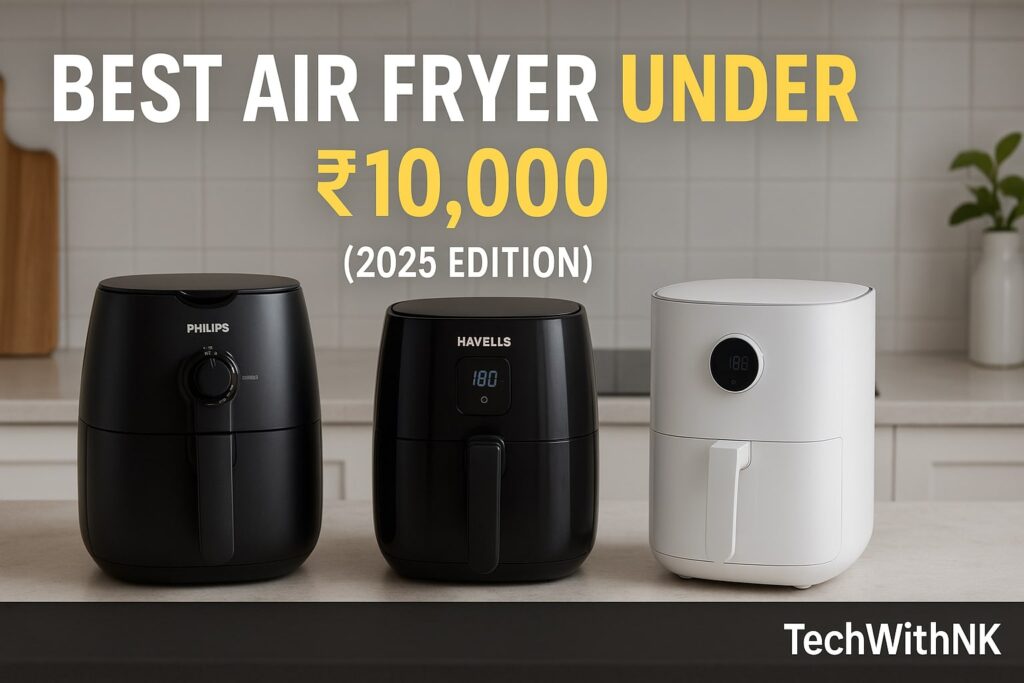Table of Contents
Toggle🏠 Introduction: Stabilizer for Home Appliances
Electricity is the lifeline of modern homes — from refrigerators to televisions, washing machines, and air conditioners, every appliance depends on a steady power supply. But in India, voltage fluctuations are common, especially in rural and semi-urban areas. These fluctuations can cause irreversible damage to your expensive electronics.
That’s where a voltage stabilizer comes in — a smart device that regulates incoming voltage, ensuring your appliances receive a safe and steady power supply.
In this guide, we’ll help you understand:
How stabilizers work
The types available
How to choose the right one for each appliance
Popular brands and buying tips
Let’s dive in! ⚡
⚙️ What Is a Voltage Stabilizer?
A voltage stabilizer is an electrical device that maintains a stable output voltage to connected appliances, despite variations in input voltage from the mains supply.
🔌 Basic Working Principle
When input voltage fluctuates:
If voltage drops, the stabilizer boosts it to the required level.
If voltage rises, it bucks (reduces) it to a safe level.
It uses electronic circuits, relays, or servo motors to achieve this.
The goal: keep your devices running within the safe operating voltage range (typically 200–240V in India).
⚡ Why Voltage Fluctuations Happen
Voltage fluctuations are more common than we think, especially during:
Peak hours when many appliances run simultaneously
Rural areas with weak power infrastructure
Lightning and short circuits
Poor wiring or overloaded transformers
Sudden switching ON/OFF of heavy machinery nearby
Even a small voltage variation (±10%) can stress electronic components. Over time, this leads to shorter lifespan and higher repair costs.
🧠 How Does a Voltage Stabilizer Work?
Let’s break it down simply:
Input Detection: The stabilizer continuously monitors input voltage.
Voltage Correction:
If voltage is low, it activates a boosting circuit.
If voltage is high, it activates a buck circuit.
Output Supply: The corrected voltage is then supplied to your appliance.
🔋 Main Components:
Transformer: Adjusts the voltage level.
Relay/SERVO Mechanism: Switches between boost and buck mode.
Microcontroller/IC: Controls operations for precision.
Time Delay System: Protects appliances during power restarts.
Thermal Overload Protection: Prevents overheating.
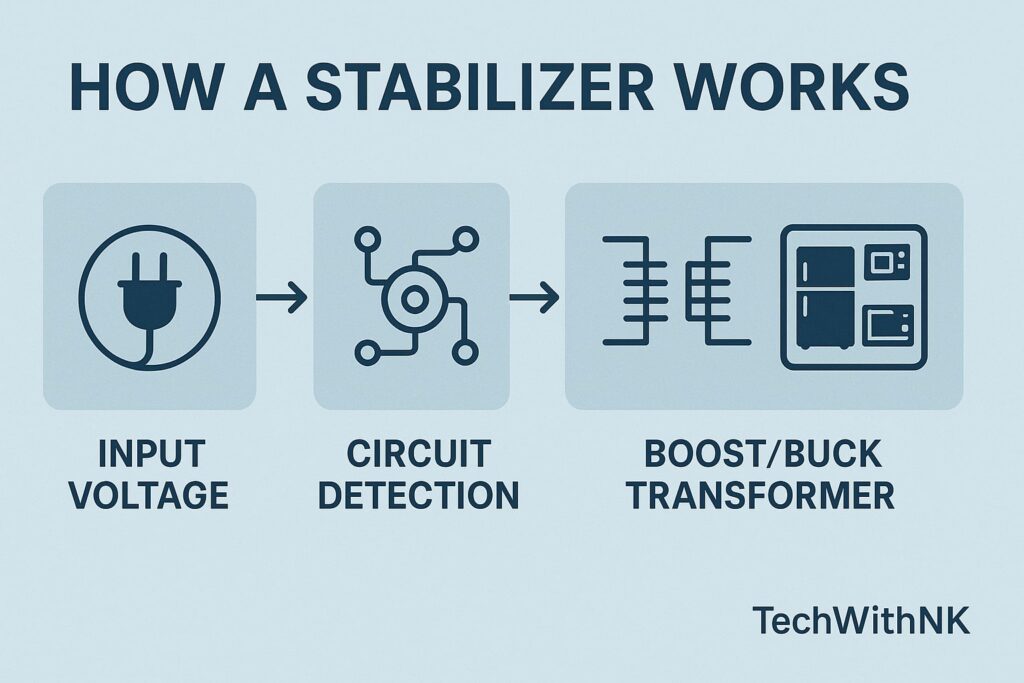
🔍 Types of Voltage Stabilizers
1. Relay-Type Stabilizer
Works with electromagnetic relays.
Shifts taps on the transformer to correct voltage.
Ideal for TVs, refrigerators, and small appliances.
Pros: Affordable, compact.
Cons: Slower response, moderate precision.
2. Servo-Controlled Stabilizer
Uses a servo motor to adjust voltage continuously.
Highly precise and suitable for ACs, washing machines, medical or industrial equipment.
Pros: High accuracy, smooth operation.
Cons: Expensive, needs maintenance.
3. Static (Electronic) Stabilizer
Uses semiconductor devices (IGBT/MOSFET) for correction — no moving parts.
Silent and fast response.
Ideal for sensitive electronics, computers, and smart TVs.
Pros: High efficiency, no noise.
Cons: Costlier than relay type.
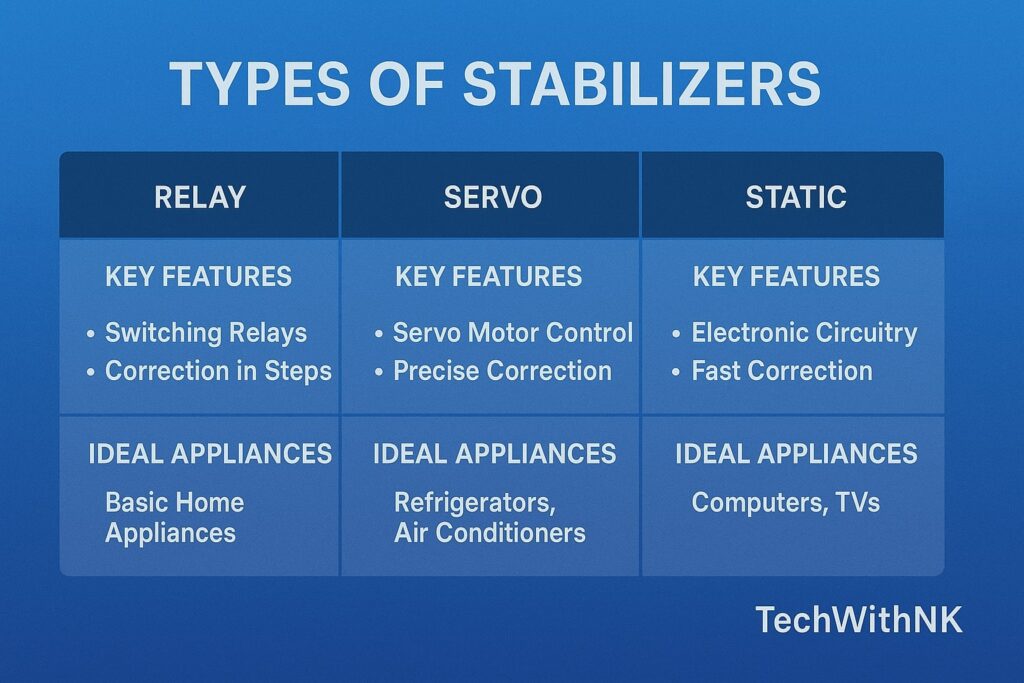
⚙️ Key Factors to Consider When Choosing a Stabilizer
1. Know the Input Voltage Range in Your Area
Before buying, check the voltage fluctuation range in your locality.
Use a multimeter or ask your local electrician.
Typical Indian voltage range: 170V – 270V.
If fluctuations go below 160V or above 280V, go for a wide-range stabilizer.
2. Check Appliance Voltage Rating and Power (Watts)
Each appliance has a power rating label at the back.
Example:
TV – 150W
Refrigerator – 300W
1.5 Ton AC – 2000W
To calculate stabilizer capacity, use this formula:
Stabilizer Capacity (kVA) = (Appliance Power in Watts × 1.25) ÷ 1000
Example:
For a 2000W AC → (2000 × 1.25) ÷ 1000 = 2.5 kVA stabilizer
Always take 25% higher capacity to handle surges safely
3. Type of Appliance
Different appliances require different stabilizers.
| Appliance | Recommended Stabilizer Type | Capacity |
|---|---|---|
| LED TV | Relay/Electronic | 0.5–1 kVA |
| Refrigerator | Relay | 1–2 kVA |
| Washing Machine | Relay/Servo | 1–2 kVA |
| Air Conditioner | Servo/Electronic | 2–4 kVA |
| Computer/PC | Electronic | 0.5–1 kVA |
| Entire House | Servo | 5–10 kVA |
4. Time Delay System
When power resumes after a cut, there’s often a voltage surge.
A time delay relay ensures your appliance gets power after a safe delay (3–5 seconds).
✅ Essential for refrigerators and ACs.
5. Thermal Overload Protection
Protects against excessive current draw or overheating due to internal faults.
If triggered, it automatically cuts off power to prevent fire or component failure.
6. Mounting and Design
Choose stabilizers with:
Wall-mounting for space-saving
LED indicators for voltage status
Smart digital displays showing input/output voltages
This not only adds safety but also convenience.
7. Warranty and Brand Reliability
Always choose reputable brands offering at least 2–5 years warranty and service support.
Trusted Indian brands include:
V-Guard
Microtek
Everest
Luminous
Monitor
Servomate
🧩 Additional Smart Features (2025 Models)
Modern stabilizers are smarter than ever! Look for:
Microprocessor-based control – for faster and precise voltage correction.
Energy-efficient transformer design – reduces power consumption.
Surge and spike protection – shields from lightning surges.
Smart LCD screen – shows live input/output voltages.
IoT-enabled models – connect to Wi-Fi and monitor remotely (upcoming trend).
💡 Choosing the Right Stabilizer for Common Home Appliances
🧊 1. Refrigerator
Use: Protect compressor motor from low voltage.
Range: 130–290V (wide range).
Features: Time-delay system, thermal protection.
Recommended: V-Guard VG 50 or Everest EW 100D.
📺 2. LED/LCD/Smart TV
Use: Protects delicate circuits from surges.
Range: 170–270V.
Features: Spike suppressor, digital display.
Recommended: V-Guard Crystal Plus, Monitor 1-DLX.
🌬️ 3. Air Conditioner (1–2 Ton)
Use: Keeps compressor safe from overloads and surges.
Range: 150–280V or 90–300V (for rural).
Features: Time delay, thermal cutoff, digital meter.
Recommended: V-Guard VG 400, Microtek EM4160+.
🧺 4. Washing Machine / Dishwasher
Use: Motor protection from low/high voltages.
Range: 160–270V.
Features: Time delay, overload protection.
Recommended: Everest EW 200, V-Guard VG 100.
💻 5. Computer / Home Office Setup
Use: Protects PSU and motherboard from spikes.
Range: 170–270V.
Features: Spike suppressor, auto cut-off.
Recommended: Microtek EM4090 or ServoMate Smart.
🧮 Example Calculation: For a 1.5 Ton AC
Power: 2000 Watts
Add 25% margin → 2500W
Divide by 1000 → 2.5 kVA Stabilizer
Input Range: 150V–280V (recommended)
Add-on features: Time Delay + Thermal Cutoff
Hence, go for a 2.5 kVA servo stabilizer with time delay.
⚠️ Common Mistakes to Avoid
❌ Buying an undersized stabilizer (causes overheating).
❌ Ignoring input voltage range of your area.
❌ Plugging multiple heavy appliances into one stabilizer.
❌ Not mounting it properly (risk of water/dust damage).
❌ Choosing cheap local brands with no warranty.
🧾 Top Recommended Home Stabilizers (2025)
| Brand | Range | Type | Ideal For | |
|---|---|---|---|---|
| V-Guard VG 400 | 150–280V | Relay | 1.5 Ton AC | |
| Everest EWD 200 | 130–290V | Relay | Refrigerator | |
| Microtek EM4160+ | 150–280V | Electronic | AC | |
| Monitor 4-DLX | 170–270V | Relay | TV | |
| Servomate 5 kVA | 90–300V | Servo | Whole House |
🛠️ Installation and Maintenance Tips
Mount stabilizer at least 1 foot above ground to avoid moisture.
Ensure proper earthing.
Keep air vents open for cooling.
Clean dust every few months.
Get professional installation for heavy appliances.
🌍 Do You Need a Whole-House Stabilizer?
If your area experiences frequent severe fluctuations, it’s better to install a mainline servo stabilizer at the distribution board.
Capacity: 5–10 kVA
Protects entire home
Best for villas, bungalows, and rural areas
It ensures all connected appliances get regulated power from one point — total home protection.
🧠 Quick Checklist Before Buying
✅ Check voltage range (input/output)
✅ Match capacity (Watts → kVA)
✅ Choose correct type (Relay / Servo / Electronic)
✅ Look for time-delay and overload protection
✅ Prefer reliable brands
✅ Ensure installation by a qualified electrician
🧭 Conclusion: Small Device, Big Protection
A voltage stabilizer may look like a small box on your wall — but it’s your first line of defense against unpredictable power surges and drops.
By choosing the right stabilizer based on your appliance, voltage range, and power rating, you ensure longevity, safety, and efficiency for all your electronics.
So, whether you’re powering an air conditioner or a smart TV, a good stabilizer is not optional — it’s essential.

